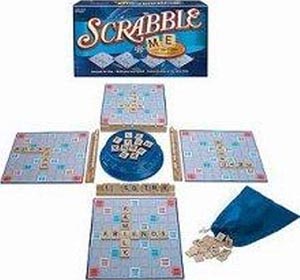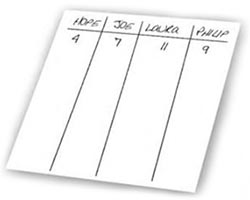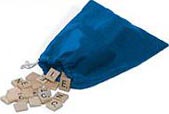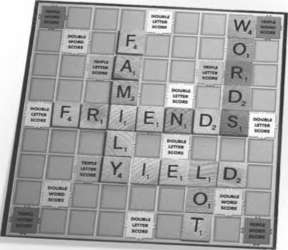

Components
- Prize Tile Podium
- 4 Scrabble player boards
- 100 Scrabble letter tiles
- tile bag
- 4 player racks.
Object of the Game
To have the highest score at game's end when all 100 tiles have been used.
Setup
Place the Prize Tile Podium in the middle of the table. Give each player a player board and a tile rack, and place these as shown in the diagram.
Put all 100 tiles inside the tile bag. Each player selects 7 tiles (unseen) from the bag, and places them on his rack. Next, one player selects tiles from the bag and places them FACE UP on the Prize Tile Podium.
How many? Three per player. For a four-player game select 12 tiles, for a three-player game select 9, two-player game select 6.
Place the bag aside, in a handy location. Choose a player to act as the scorekeeper. Using a blank sheet of paper and a pencil, set up a score sheet with each player's name at the top of a column.

Game Play
-

On each round, and at the same time, each player builds a word on their own player board using tiles from his rack.
The first word must be placed, horizontally or vertically, so that one of its tiles covers the center pink star square. Succeeding words must include at least one tile of a word already on the player board.
All tiles played must form complete words as found in a reference dictionary. (Before the game begins, players should agree which dictionary they will use in case of a challenge).
All words labeled as a part of speech (including those listed of foreign origin, as archaic, obsolete, colloquial, slang, etc). are permitted with the exception of the following: words always capitalized, abbreviations, prefixes and suffixes standing alone, words requiring a hyphen or apostrophe.
Any word may be challenged before the next round starts. If the word challenged is unacceptable, the challenged player takes his tiles from his board and does not score for that round.
If the word challenged is acceptable, the challenger loses his next turn (and is not allowed to build a word on his board). Consult the dictionary for challenges only.
-

Scoring is exactly the same as in regular Scrabble. The score value of each letter is indicated by a number at the bottom of the tile. The score value of a blank is zero.
The score for each turn is the sum of the letter values in each word formed or modified on that turn, plus the additional points obtained from placing letter tiles on premium squares.
Premium Letter Squares: A light blue square doubles the score of the letter placed on it and a blue square triples the letter score. Premium Word Squares: The score for an entire word is doubled when one of its letters is placed on a pink square and it is tripled when one of its letters is placed on a red square.
Include premiums for double and triple letter values, if any, before doubling or tripling the word score. If a word covers two premium word squares, the score is doubled and then redoubled (4 times the letter count), or tripled and then re-tripled (9 times the letter count), etc
Note: The center square is a pink square, which doubles the score for the first word.
When all four players have completed their word, the scorekeeper records the value of each word.
-

Players now refill their racks in a special way. Beginning with the player who earned the LOWEST score on this round, then the player on his left, etc., players take turns picking one tile at a time to refill their racks.
(In case of a tie for lowest score, the players whose word contains the letter closest to "A" picks first). Players continue picking replacement letters until each has refilled his rack.
Note: Unlike regular Scrabble, where all replacement tiles are drawn unseen, in Scrabble Me you have a choice. Whenever you select a tile, take one either from the tile bag (unseen) or from the Prize Tile Podium.
If you see a letter you like on Prize Tile Podium, it is a good idea to pick it before an opponent nabs it.
Selecting a tile from the tile bag is a bit of a gamble (since you don't know what tile you're picking), but you could get lucky and pick a great one.
-
Once each player has rebuilt his rack to 7 tiles, refill the Prize Tile Podium by drawing tiles out of the bag and placing them face up on the podium.
At the start of each round, the podium should have the same number of tiles as at game's start (i.e. twelve for a 4-player game, nine for a 3-player game, etc).
-
The next round is now played. Play continues in this manner until there are no tiles remaining in the tile bag (when tiles run short, refill the Podium to whatever extent you can).
Players will refill their racks only from the Podium after the bag is expended. One last round will now be played.
-
On this "last" round, the player who played the word with the lowest score earns ONE MORE TURN. This player, and only this player, is permitted to form a bonus word (if possible) on his board. Game play now stops.
Note: The game ends earlier if no player can form a word during a round.
-
The scorekeeper tallies everyone's scores. The player with the highest score wins.
Blank Tiles 
Special Swapping Rule
A special SWAP rule affects play whenever a blank tile is played. After a player uses a blank ("wild") tile in a word, and the round is scored, he must exchange his board for the board of an opponent (his choice). It is best to swap for a board that has a lot of open area to build upon.
If, in the very rare case, two players play blank tiles during the same round, both will make a swap. But, the player who scores lower during that round gets to swap LAST.
That player could even get his original board back if it was taken in the first swap.
 A great board to choose in a swap! |
Helpful Hints
-
Rounds are not timed, but the game plays better when it moves along at a steady pace. If one player is consistently taking longer to build than the other players, encourage him to speed it up!
-
Don't neglect to study your opponents' boards! The player next to you might be building his words towards the all-important Triple Word space in one of the corners.
If you have a blank tile, you may want to save it and play it at the most opportune time to swap for your neighbor's board and deny him that bonanza. (After all wouldn't you rather build on that Triple Word space yourself?)
-
Sometimes you might select a tile from the Prize Tile Podium just to prevent your opponent from getting it, even if you can't immediately use it. This is a good defensive strategy-especially when high point letter tiles are up for grabs.
Continue Reading


